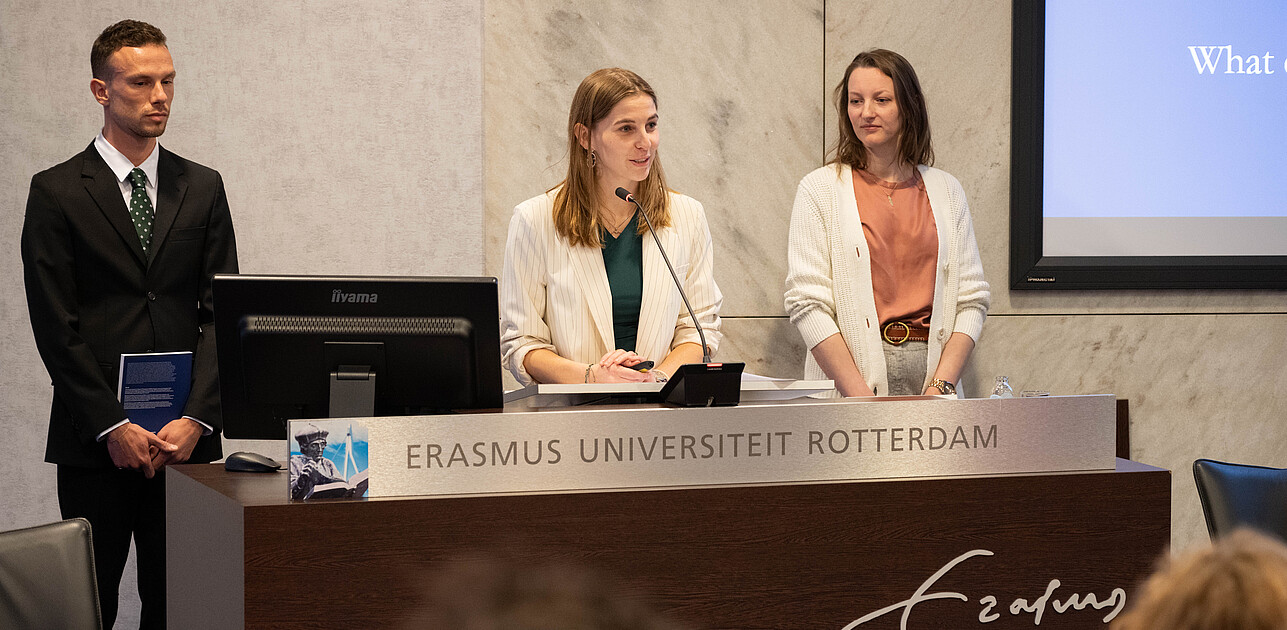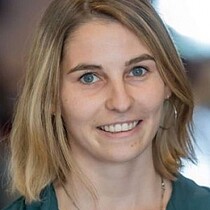

Article: Wednesday, 09 October 2024
A recent PhD study has shed light on the hidden challenges of organizing for positive societal impact. In her doctoral research, Dr Sylke Jellema uncovered the complexities in measuring the true impacts of sustainability certification standards, the difficulties of keeping mission-driven employees united under a shared cause, and how beliefs on impact authority can be embedded in, and hinder, everyday communications. Sylke hopes her research will challenge both theoretical and practical assumptions about what it truly means for businesses to ‘do good’. She successfully defended her PhD thesis Brace for Impact: Good Intentions, Unintended Consequences, and the Role of Performative Micro-Processes in Organizational Efforts for Societal Change on 14 June 2024 at Rotterdam School of Management, Erasmus University (RSM).
Organising for sustainability is a hot topic in the business landscape, but good intentions and polished mission statements aren’t enough to catalyse real positive change. Dr Jellema contends that the academic approach to understanding the phenomenon of ‘organising to do good’ has been too simplistic. “Good intentions alone do not guarantee positive impacts. There are twists and turns, roadblocks, and potential dead ends along the way.”.
Sylke’s dissertation includes three studies on the challenges of organising for positive impact which collectively reveal how hidden micro-processes and simplistic assumptions can undermine organizations’ efforts to create meaningful positive change.
First, she reviewed current academic literature on the impact of sustainability certification standards and explored the complexities of measuring impact across social, economic, and ecological systems. By taking such a system approach, she examined impact as a synergetic outcome of interrelated events. “These standards are designed to systematically limit the negative impact of our production and consumption patterns, yet, we found that most studies only examined isolated and surface-level impacts, such as income increases for a specific group of farmers or the hectares of forest conserved in a particular region.
“We need to dig deeper to understand the bigger picture – how these standards generate outcomes across different levels and units of analysis, how they affect various stakeholders differently, and how they might also lead to unintended spill-over effects.” she said.
Studies two and three were based on Dr Jellema’s three-year ethnographic field study of a globally recognized impact-driven organisation.
In her second study, Sylke applied the theory of sensemaking – how individuals and groups generate meaning based on cognitive and external cues – to understand the challenges of mobilising a group of mission-driven people behind a shared corporate purpose. She found that a spiral of intensifying commitments to personal values and ideals can hinder such alignment. “I followed a group of passionate employees dedicated to making a difference. But in the end, they could not agree on what that difference should be. Despite their dedication, they ended up pulling in different directions and drifted apart instead of coming together. This study serves as a cautionary tale for organizations about the dangers of having a too committed workforce.”
The third study investigated the role of language in collaborations for impact within global governance structures. Dr Jellema showed how communication practices can become socialized based on shared beliefs about who holds authority over impact activities. Groups with such similar beliefs can develop their own ‘speech communities’, characterized by a shared particular language use, such as word choices, intonation, and argumentation styles.
“We found that employees can co-create their own socialised languages, bound by shared views on who has the authority over the generation of impact. Hence, despite the employees speaking the same language, their membership in different speech communities may hinder the communication of actual meanings and intentions.”
Dr Jellema’s research serves as a warning for anyone aiming to steer their organisation towards positive societal goals. “Avoid taking a simplistic mindset to creating impact,” she advises. Instead, she encourages academics and practitioners to not only recognize that impact-related action and reaction relationships are multi-dimensional and dynamic, but also to realize that good intentions can sometimes lead to unintended consequences, which need to be accounted for.
Before her PhD, Sylke graduated from RSM’s MSc Global Business & Sustainability in 2016. Her experiences in this master’s program, along with a six-month journey across Southeast Asia and Oceania, deepened her fascination with the definition of ‘doing good’ and the obstacles that prevent our society from organizing for societal process.
She is a member of the Dynamics of Inclusive Prosperity initiative at Erasmus University Rotterdam that focuses on enabling as many people as possible to benefit from increasing prosperity, whilst minimising the negative consequences.
Her work has been published in the academic journal Business & Society and featured in academic books. She has reviewed works for the Academy of Management Annual Meeting and Organization Science, co-organized an academic conference at RSM, taught various sustainability-related courses in bachelor and master programs, and served as the PhD representative for the Department of Business-Society Management. Currently, Sylke has relocated to Lagos, Nigeria, where she aims to continue her academic projects and further broaden and deepen her understanding of organizing for societal impact.


Science Communication and Media Officer
Rotterdam School of Management, Erasmus University (RSM) is one of Europe’s top-ranked business schools. RSM provides ground-breaking research and education furthering excellence in all aspects of management and is based in the international port city of Rotterdam – a vital nexus of business, logistics and trade. RSM’s primary focus is on developing business leaders with international careers who can become a force for positive change by carrying their innovative mindset into a sustainable future. Our first-class range of bachelor, master, MBA, PhD and executive programmes encourage them to become to become critical, creative, caring and collaborative thinkers and doers.
